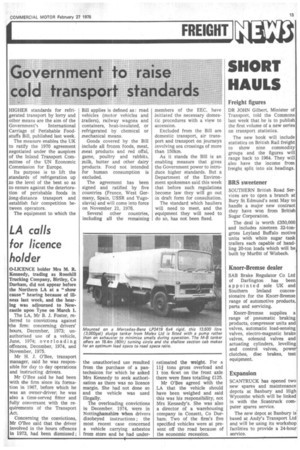HIGHER standards for refrigerated transport by lorry and other means
Page 15

If you've noticed an error in this article please click here to report it so we can fix it.
are the aim of the Government's International Carriage of Perishable Foodstuffs Bill, published last week.
The measure enables the UK to ratify the 1970 agreement negotiated under the auspices of the Inland Transport Committee of the UN Economic Commission for Europe.
Its purpose is to lift the standards of refrigeration up Lo the level of the best so as to ensure against the deterioration of perishable foods in long-distance transport and establish fair competition between operators.
The equipment to which the Bill applies is defined as : road vehicles (motor vehicles and trailers), railway wagons and containers, heat-insulated, or refrigerated by chemical or mechanical means, Goods covered by the Bill include all frozen foods, meat, meat products and red offal, game, poultry and rabbits, milk, butter and other dairy products. Food not intended for human consumption is excluded.
The agreement has been signed and ratified by five countries (France, West Germany, Spain, USSR and Yugoslavia) and will come into force on November 21, 1976.
Several other countries, including all the remaining members of the EEC, have initiated the necessary domestic procedures with a view to accession.
Excluded from the Bill are domestic transport, air transport and transport on journeys involving sea crossings of more than 150km.
As it stands the Bill is an enabling measure that gives the Government power to introduce. higher standards. But a Department of the Environment spokesman said this week that before such regulations become law they will go out in draft form for consultation.
The standard which hauliers will need to meet, and the equipment they will need to do so, has not been fixed.




















































































